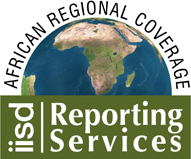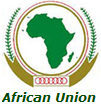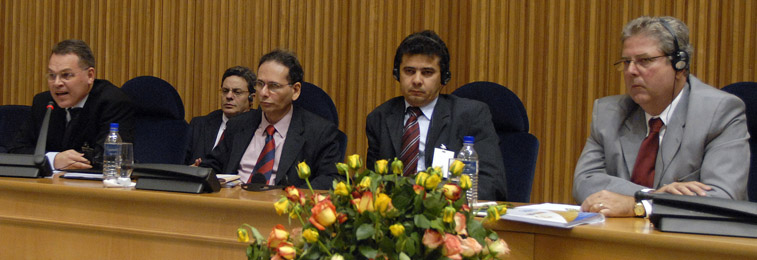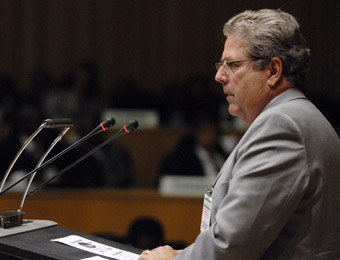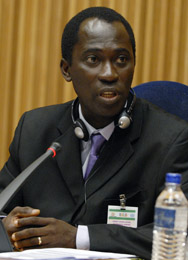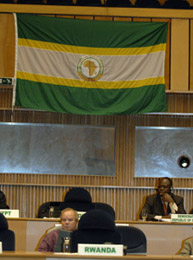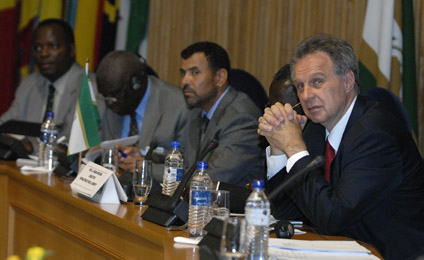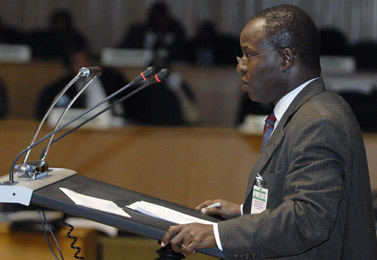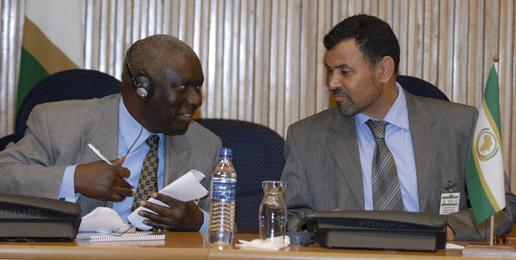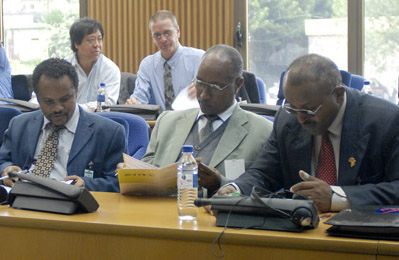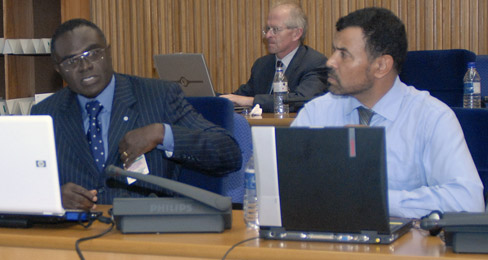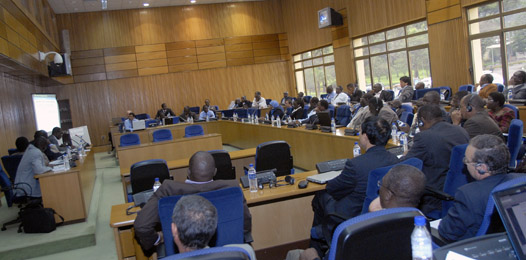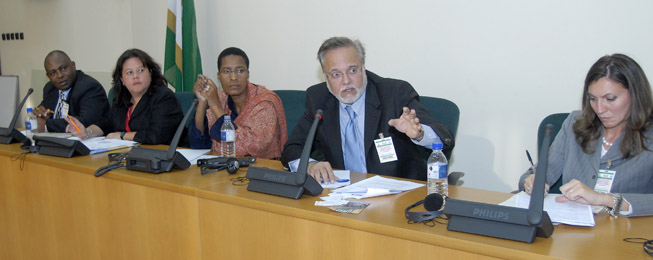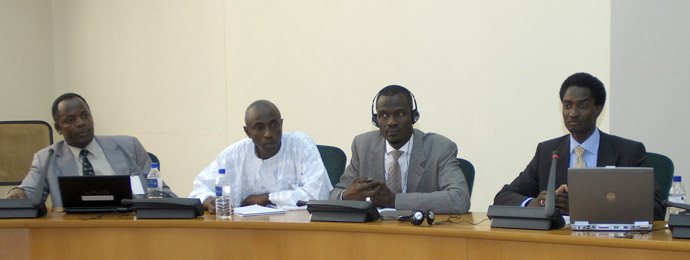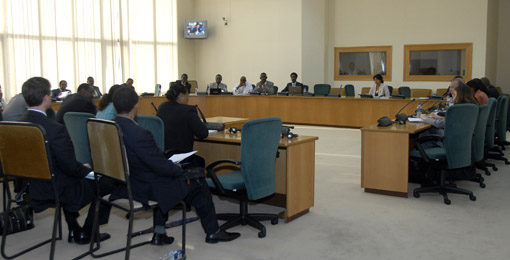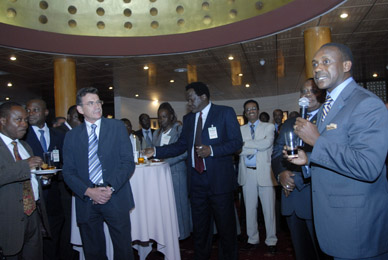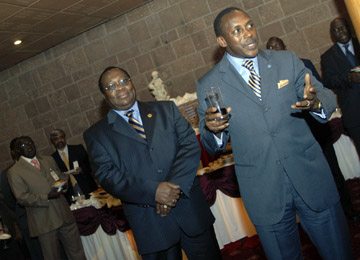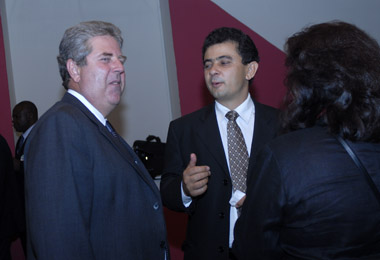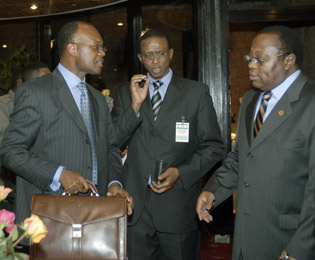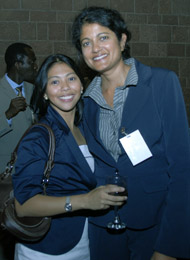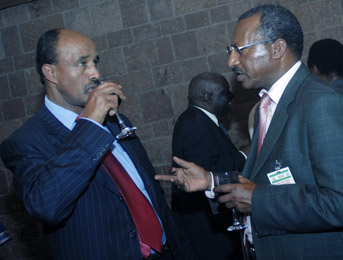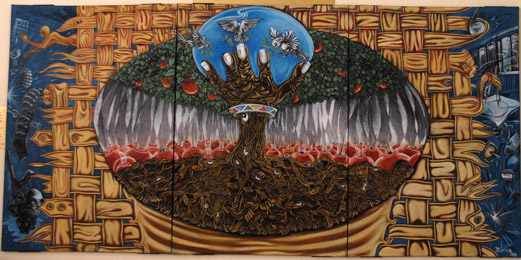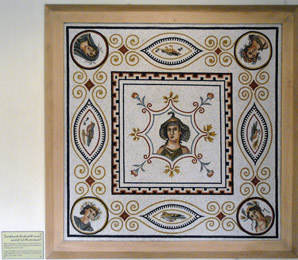Highlights from Tuesday, 31 July
2007
On Tuesday, participants to the first High-level Biofuels Seminar in Africa convened in plenary to examine the Brazilian experience in biofuel development and its potential application in Africa, considering, among other factors, its contribution to poverty reduction, the role of international cooperation, research and development, and prerequisites for sustainable biofuel development programmes. In the afternoon, parallel sessions were convened, which focused on: biofuel conversion technologies, including ethanol, biodiesel, biogas and biomass gasification; and on cross-cutting issues relating to policy and regulatory frameworks, environment and sustainability, and financing and investment. |
| Brazilian delegates (left to right): Guilherme Cassel, Brazilian Minister of Agrarian Development, Antonio José Ferreira Simões, Brazilian Ministry of Foreign Affairs, José Nilton de Souza Vieira, Brazilian Ministry of Agriculture, Livestock and Food Supply, and Ricardo de Gusmão Dornelles, Brazilian Ministry of Mines and Energy |
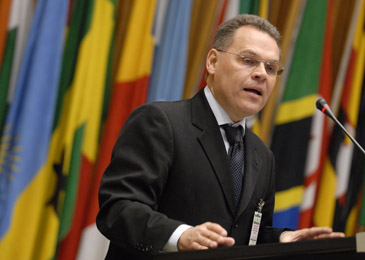 |
|
Guilherme Cassel, Brazilian Minister of Agrarian Development (left),
provided a historical overview of Brazil's biodiesel programme, noting its main objective is to combat poverty and social inequality in rural areas, particularly with respect to energy access. Elaborating on the family nature of farming in rural Brazil, he underscored that the biofuel programme is viable for both small- and large-scale farms. He described the programme's policy and institutional features, including biodiesel legislation, a legal framework for protecting investors, a mandatory limit for biofuel production, social marketing of products, and tax exemptions.
Ricardo de Gusmão Dornelles, Ministry of Mines and Energy, Brazil (right), stressed that the main objectives of Brazil's biofuels policy include increasing biofuels production and consumption, and promoting a global biofuels market. Discussing the Brazilian ethanol experience, he said that ethanol can be produced at competitive costs and from different raw materials, and noted the predominance of sugarcane use for ethanol production in Brazil. He also offered his country's technical support for ethanol production in Africa.
|
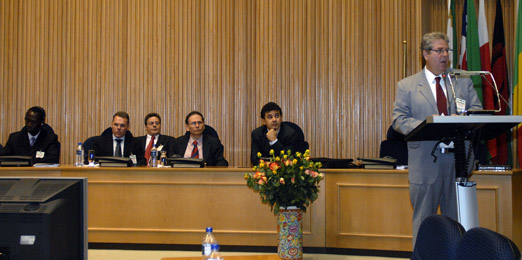 |
|
| Lawrence Darkwah, Kwame Nkrumah University of Science and Technology (KNUST), Ghana (right), chaired the session. |
The Brazilian Experience in the African Context |
| Heinz Leuenberger, Director, Energy and Cleaner Production Branch, UNIDO (right), chaired this session |
 |
|
Mpoke Bokanga, African Agricultural Technology Foundation (AATF) (left), discussed research and development aspects of biofuel development based on Nigeria's experience with ethanol production. He noted that as the world's largest cassava producer, Nigeria has been involved in ethanol production since 1973, is exploring its use as an alternative to oil, and has recently adopted a 10% ethanol standard for transport. He identified the need to move from ethanol to butanol production in the future and to establish bioenergy scientific intelligence units.
Abeeku Brew-Hammond, Kwame Nkrumah University of Science and Technology (KNUST), Ghana (right), emphasized the need for government leadership in kick-starting the biofuel industry and in ensuring protection of small-scale farmers. Noting that biofuel technology is knowledge-intensive, he called for sharing experiences and know-how at the international, regional and national levels, and for mobilizing regional resources and identifying African countries' comparative advantages regarding the use of various feedstocks and biofuel technologies. |
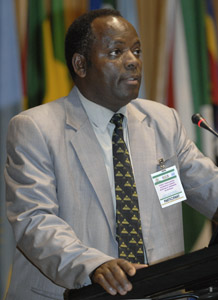 |
|
Thomas Sinkala, Biofuels Association of Zambia (left), presented on biofuels for poverty reduction, stressing that unless Africa develops biofuels, poverty will be perpetuated. Drawing a comparison between biofuel development and mining, he argued that the ongoing “biofuels hype” exaggerates concerns related to food security, land requirements and sustainability.
Francis Yamba, COMPETE Project and Youssef Arfaoui, African Development Bank (AfDB) (right) |
| Parallel sessions on conversion technologies: ethanol, biodiesel, biogas and biomass gasification |
Ethanol: S D Liwimbi, Ethanol Company Limited (center), chaired the session
Francis Johnson, Stockholm Environment Institute, Sweden (right), suggested that bioethanol has become both a regional and global issue, and said that to develop bioethanol programmes, multisectoral and multipurpose strategies are needed. He illustrated a number of global scenarios for ethanol blending by 2030, and suggested that the biofuel market can become competitive by reducing international trade barriers. Elaborating on the potential of ethanol in Southern Africa, he highlighted land availability and high crop productivity in certain countries. |
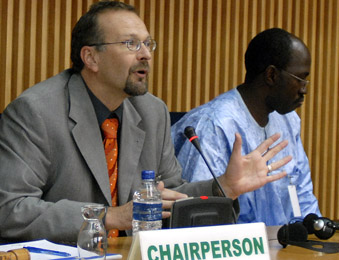 |
|
Biodiesel session Chair
Rainer Janssen, WIP (left)
Ibrahim Togola, Mali Folkecenter (second from left), highlighted differences between pure plant oil and biodiesel technologies. He said there is potential for further biofuel use in Africa, and that biodiesel may have a place, but he also suggested pure plant oil production for the Sahel, as it is easy to maintain, manipulate and access. He stressed that, regardless of the technology used, a clear regulatory framework is needed. |
Biogas and biomass gasification:
Srinivasaiah Dasappa, Indian Institute of Science (above left), examined the potential of biomass gasification, noting that it can replace existing oil-based electricity generation in remote communities without major capital investments, thus contributing to rural development and climate change mitigation. He identified several barriers to wider application of this technology, including the lack of comprehensive data on regional demand, existing fossil-fuel based power generation, and estimates of biomass potential.
John Afari-Idan, Biofuel Task Team Leader,
African Roundtable on Sustainable Consumption and Production
(above center), presented on the industrial applications of biogas technology, highlighting Ghana's experience in introducing this technology into agriculture, healthcare, hospitality and other industries. Criticizing current waste management practices, he stressed the potential of biogas for generating energy, achieving better sanitation, reducing pollution and mitigating climate change.
Graziano Bertogli, UNIDO International Center for Science (above left), noted that bioenergy production is a promising opportunity for African countries, but encouraged considering broader renewable energy options, such as geothermal energy. Noting that 70% of the world's water consumption is used for agriculture, he cautioned that biofuels may increase pressure on water resources, especially since biofuel crops are among the most water-intensive. |
| Parallel sessions on cross-cutting issues: policy and regulatory frameworks; financing and investment; and environment and sustainability |
| Combined session on policy and regulatory frameworks, and financing and investment: Co-Chair Ibrahima Konate,
West African Economic and Monetary Union (center), and Co-Chair Kwadwo Asenso-Okyere, International Food Policy Research Institute (IFPRI) (second from right) |
| Jaques Moulot, UN Economic Commission for Africa (ECA), presented on policy and regulatory frameworks for biofuel development in Africa. He suggested that policy and regulatory guidelines could: identify priority feedstocks; favor the use of existing crops; safeguard food security; set national consumption targets; remove investment barriers; and create incentives for private sector participation. |
Environment and sustainability session (left to right): Stanford Mwakasonda, University of Cape Town, Rocio Diaz-Chavez, Imperial College London, Yogesh Vyas, African Development Bank (AfDB), Njeri Wamukonya, UNEP, and Maria Michela Morese, GBEP |
| Participants during the environment and sustainability session |
Reception hosted by UNIDO, Monday evening, 30 July
|
| Art around the AU building |
|
